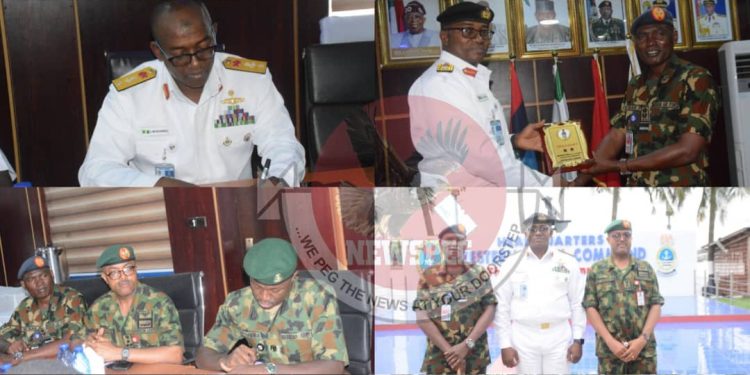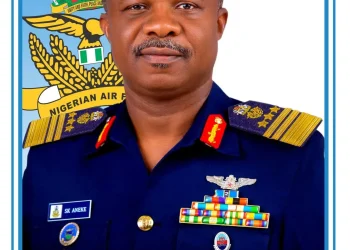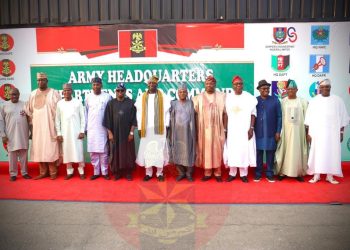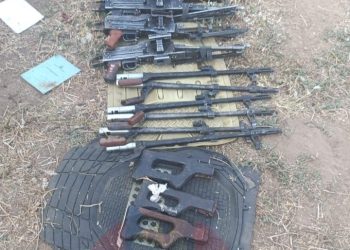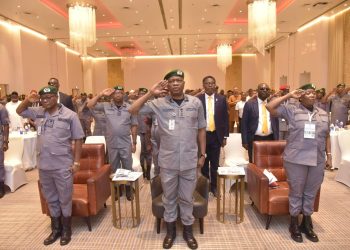By Nkechi Eze
In a significant move to update and strengthen Nigeria’s military doctrinal framework, the Defence Headquarters (DHQ) Committee on the Review of the 2017 Joint Defence Doctrine embarked on a crucial visit to the Headquarters of the Western Naval Command (WNC) in Apapa, Lagos, on Thursday, July 24, 2025. The visit marks another milestone in the series of consultations aimed at ensuring that the nation’s defence strategy keeps pace with the dynamic and increasingly complex nature of security threats facing Nigeria.
The high-powered committee, led by Air Vice Marshal M.A. Isah, was received on arrival by the representative of the Flag Officer Commanding the Western Naval Command and the Command Operations Officer, Commander A. Mohammed. The visit, which featured an extensive interactive session, brought together a cross-section of Principal Staff Officers (PSOs), Commanders, and Commanding Officers from the various units and ships under the Western Naval Command. The objective of the session was to foster critical discourse and gather field-level input for the doctrinal review process.
During the discussions, participants delved into a wide array of strategic and operational issues central to the future of joint military operations in Nigeria. Among the major topics explored were the coordination and effectiveness of joint operations across the Armed Forces, the systems of command and control governing those operations, and the relevance and optimization of the Joint Integrated Logistics System alongside the Central Procurement Doctrine. These discussions underscored the urgent need for cohesion, inter-service integration, and the standardization of procedures to achieve seamless operational synergy.
One of the notable highlights of the engagement was the emphasis on joint training and doctrinal unification, with particular focus on the recent establishment of the Armed Forces Aviation Institute. Participants agreed that the new institute presents an opportunity to institutionalize joint doctrine and ensure consistent training standards across all branches of the Nigerian military.
Another key subject discussed was the growing importance of media operations and the role of information warfare in modern-day military engagements. Participants underscored the necessity of articulating a comprehensive strategic communications doctrine that can counter adversarial narratives and protect Nigeria’s information space from external manipulation and disinformation. The use of modern communication tools and platforms for both defensive and offensive information warfare was identified as a critical area requiring integration into the updated doctrine.
Further enriching the session were recommendations on expanding the inclusivity of the review process by involving subject-matter experts, defence scholars, and academics from tertiary institutions across the country. Participants maintained that this multidisciplinary input would deepen the doctrinal framework and introduce contemporary academic and empirical perspectives that reflect the broader security ecosystem.
The forum also spotlighted operational readiness, with strong calls made for institutionalising pre-deployment preparations and exercises before troops are launched into the theatre of operations. Officers emphasized that such pre-deployment structures would enhance mission preparedness, reduce tactical errors, and improve the operational effectiveness of the Armed Forces during joint and special operations.
In his closing remarks, Team Leader Air Vice Marshal M.A. Isah commended the officers of the Western Naval Command for their active participation and candid contributions. He stressed the imperative of constant doctrinal evolution in view of the fluid and often unpredictable nature of modern security challenges. “The essence of this review is to respond effectively to the multifaceted security threats confronting our nation. Doctrine is not static; it must evolve with the times, and this process requires the input of all stakeholders, field commanders, policy planners, academia, and strategic partners alike,” AVM Isah stated.
He further assured the participants that the observations and recommendations gathered during the engagement would be carefully considered and integrated into the final review document. According to him, the Defence Headquarters remains committed to building a doctrinal foundation that reflects the realities on the ground while preparing the Armed Forces of Nigeria for future conflict environments that will demand greater inter-agency and inter-service cooperation.


